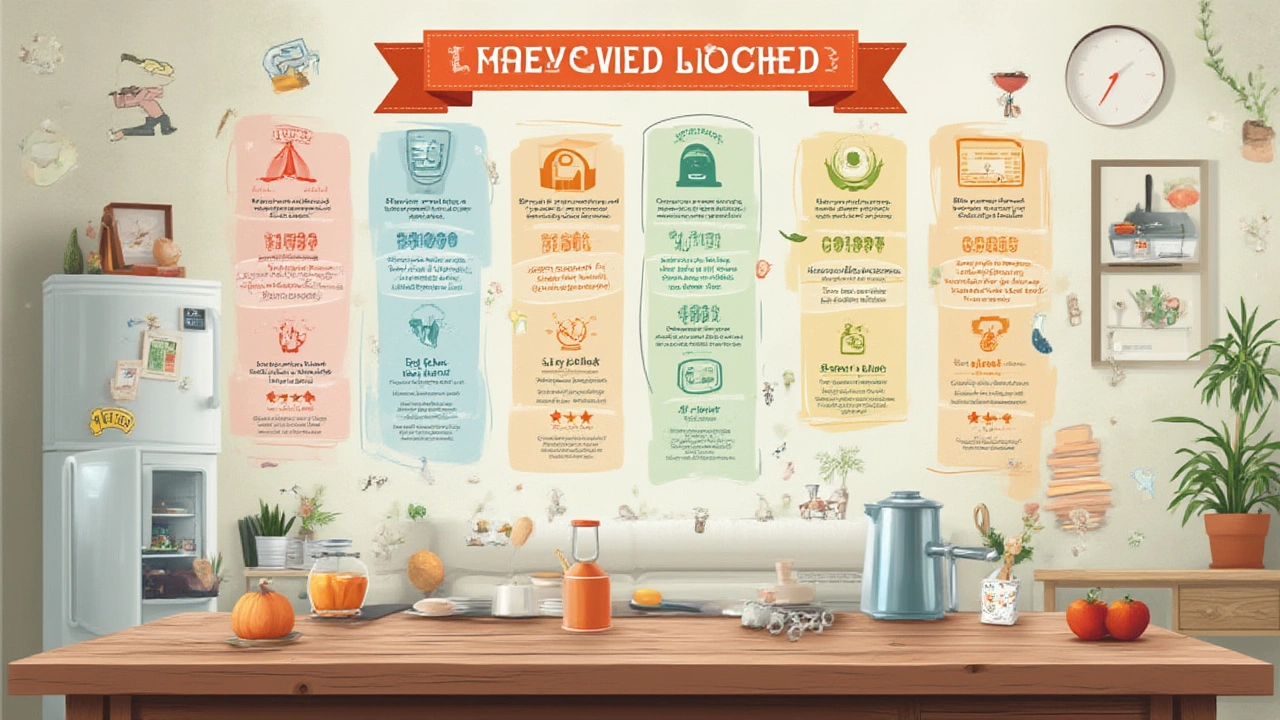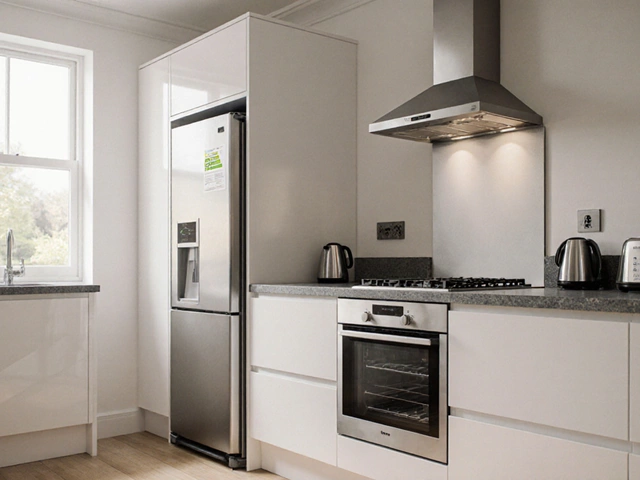Think about this: you probably got out of bed, headed straight for the kettle, switched it on, and made yourself a cup of tea this morning. That simple act, so routine in homes across the UK, wraps up what an appliance really is. An appliance is simply a device or piece of equipment, often powered by electricity, that helps you complete an everyday task more easily. Maybe it prepares food, cleans your clothes, or keeps your milk cold. Whenever you plug something in or press a button and it “just works” to make your chores faster—that’s an appliance at work. But the world of appliances runs deep, with dozens of types, from the humble toaster to mind-boggling smart fridges.
Everyday Examples of Appliances in the Home
When most of us hear the word “appliance,” a fridge or washing machine probably jumps right out. These are the heavy lifters. The star of the kitchen, for many, is the oven or cooker—if you cooked a roast last Sunday, you know what I mean. The washing machine, meanwhile, quietly turns dirty socks and shirts into passable outfits, sometimes for years on end. Yet, these aren’t the only contenders. There’s a whole parade of helpful devices that fit the bill, each with their own tricks and quirks.
Let’s break down popular home appliances:
- Fridges and Freezers: Pretty much the cornerstone of modern living—they keep our food fresh by keeping it chilly. The UK’s average fridge-freezer stands at 60cm wide, which suits most kitchens without any fuss.
- Washing Machines: These wonders take care of the week’s dirty laundry, with recent models using less water than ever. Energy labels now guide you: A-rated ones can save a family over £100 a year.
- Dishwashers: No-one really likes washing dishes by hand, right? Dishwashers step up, slashing water use by about 50% versus doing it in the sink. Modern models even handle delicate glasses and burnt-on pans.
- Ovens and Hobs: From baking birthday cakes to crisping up oven chips, these bring the heat (literally). Electric ovens are the UK norm, with about 90% of British homes owning one.
- Microwaves: Short on time? Microwaves zap food using electromagnetic waves, reheating leftovers in seconds. They became popular in Europe in the ‘80s and are now in nearly every British kitchen.
- Kettles: Can you think of anything more British? In a 2024 survey, nearly 97% of UK households owned at least one kettle.
Tabletop gadgets get their due credit too. Think coffee machines, blenders, toasters, or air fryers. Each appliance manages a specific task, saving you those precious extra seconds and sometimes a bit of sanity too.
| Appliance Type | % of UK Homes (2024) | Average Lifespan (years) | Average Cost to Run/year (£) |
|---|---|---|---|
| Fridge-Freezer | 99% | 11 | 62 |
| Washing Machine | 96% | 10 | 54 |
| Dishwasher | 48% | 12 | 44 |
| Oven | 90% | 14 | 56 |
| Kettle | 97% | 6 | 25 |
Beyond the stats, appliances can be quirky. For instance, fridges in the UK open the opposite way to standard US ones. That’s not just a fun fact—it’s a reminder that appliances shape daily life, and tiny details can make them more or less convenient.

Choosing the Right Home Appliance
Now, before rushing off to buy that sparkling new air fryer or a silent washing machine, it helps to cut through the marketing fluff. Price, size, noise, energy-efficiency—these all matter, sometimes more than slick features. Trust me, nothing is worse than bringing home a massive fridge, only to realise your kitchen door won’t let it through. Or wrestling your way through settings you’ll never use.
Let’s talk through what you really want to consider:
- Size and fitting: Measure your space. Don’t guess. Leave some breathing room behind big appliances for proper airflow so they work better and last longer.
- Energy rating: An energy efficient appliance isn’t just good for the planet, it keeps monthly bills down. Yearly savings add up: switching an old C-rated fridge for a modern A-rated one can shave up to £40 a year off your electricity. Over a decade, that’s £400 you won’t spend.
- Water use: For dishwashers and washing machines, check how many litres per cycle. Many modern washers use as little as 45 litres, a huge jump from over 90 litres in the 1990s.
- Build to last?: Do a bit of digging before you hit “buy.” Some manufacturers are notorious for short warranties and difficult repairs. The right choice can outlive the cheap-and-cheerful option by years.
- Noise: If your home’s open-plan, this matters. Ask for the decibel (dB) rating; anything under 50dB is a whisper compared to older models.
- Features: Fancy touch screens look cool, but you may just want simple dials. Prioritise what actually makes your life easier.
Sometimes you get what you pay for, but expensive doesn’t always mean better. Keep an eye out for reviews, especially from folks who’ve had their appliance for a while. Sometimes a budget model lasts longer and works just as well. Plus, repairing and maintaining appliances does wonders—regular descaling for kettles, cleaning filters in washers, and defrosting the freezer will stretch their lifespans, often by a few extra years.
Sustainability counts, too. Look for brands with parts readily available, or consider refurbished appliances for a smaller impact on the planet. In the UK, most white goods can be recycled at local recycling centres—don’t just toss them out.
Smart tech is creeping in everywhere. Now there are fridges that remind you to buy milk, washing machines you can set with your phone, and ovens that offer guided recipes. If you like clever gadgets and want to make your daily routine more hands-free, these can be tempting. But always weigh smart features against reliability.

Appliance Care Tips and Interesting Facts
Once you’ve got your army of appliances lined up, it takes a bit of love (and some low-key stubbornness) to keep them running. Most breakdowns don’t happen because of faulty parts but from being stretched too hard or not looked after at all. Want your fridge to outlast your next lease? Want the washing machine spin to sound less like a jet engine on take-off? Stick to a few basics and you’ll be surprised how long they hang in there.
- Kettles: If you’re in a hard water area—which, living in Bristol, you definitely are—descale every month. Limescale build-up cuts heating efficiency, so your tea takes longer, and your bills creep up.
- Washing Machines: Once a month, run a hot, empty wash with a bit of white vinegar or a cleaner tablet. This blasts away gunk and odours. Leave the door open after washes—keeps things fresh and mildew-free.
- Ovens: Don’t let spills bake on for weeks. A quick wipe after cooking saves hours of elbow grease long term. Use proper oven cleaners and don’t forget to clean behind the knobs and seals.
- Fridge-Freezer: Wipe door seals every so often, or cold air starts leaking out, meaning the motor works double-time. Defrost the freezer before the ice looks like a glacier—your food lasts longer, and the appliance runs quieter.
- Dishwashers: Yes, they clean themselves while working. But the trays and filters still need an occasional rinse to avoid that musty smell or food gunk buildup.
Here’s a strange fact: the first ever home refrigerator, made in the early 20th century, was so loud it sometimes needed its own separate room. Early dishwashers were a luxury, but now, over four in ten UK homes have one—and their water use is far more efficient than you think. On the topic of history, consider that until the 1950s, washing machines in Britain were so big and clunky that you’d only find one at a local wash-house, not in a standard home!
If you’re saving up for an upgrade, aim for sales in September or early March—this is often when big retailers clear out current models to make room for new ones. Signing up for appliance cover or a care plan (especially for main appliances like fridges and cookers) might sound boring, but it can save you a nasty bill when things go wrong.
Got an old appliance that’s finally bitten the dust? Many retailers will take it away when they deliver a new one. In the Bristol area, local councils offer free or cheap collection, and plenty of community groups are happy to take working (but unwanted) gadgets off your hands.
Ultimately, an appliance is more than just a box that plugs in—it’s a piece of daily life, often working unnoticed until it starts to fail. When you choose, care for, and maybe even fix your own appliances, you’re not just saving money: you’re keeping your household running smoothly day after day, cuppa by cuppa and load by load.




